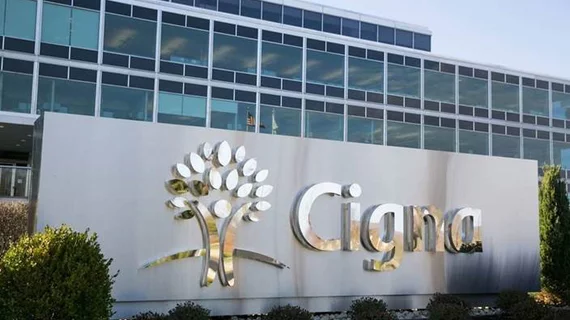Radiology groups express ‘profound objection’ to Cigna policy change
Radiology societies are expressing “profound objection” to a reimbursement policy change from Cigna.
The Bloomfield, Connecticut-based health insurer recently updated its guidelines to label closed-loop spinal cord stimulation therapy as “experimental.” Around for years, the treatment is used to help patients dealing with chronic disorders, including severe debilitating pain.
Medical groups representing 95,000 providers—including the American Society of Neuroradiology, American Society of Spine Radiology and Society of Interventional Radiology—shared their dismay in a recent communication.
“We express our profound objection to the current characterization by your coverage policies of closed-loop spinal cord stimulation therapy as ‘experimental, investigational, and/or unproven,’” radiologists wrote Nov. 30 to two physicians who handle coverage policy at Cigna. “It is our firm belief that such a classification does a disservice to patients and neglects the scientific research, rigorous clinical trials, and evidence supporting the efficacy of closed-loop SCS therapy.”
Radiologists—alongside anesthesiologists, neurologists, surgeons and psychologists—highlighted the “evolutionary” nature of this treatment approach. As opposed to a standard neurostimulator, closed-loop technology actively monitors spinal cord responses to electrical stimulation. It then can automatically adjust the strength of stimulation in response to patients’ level of comfort and pain relief, the societies noted. Scientists have proven the efficacy of this approach, they added, through high-level peer-reviewed publications, including randomized and blinded clinical trials.
“In light of this compelling body of evidence, we strongly suggest you reconsider your current coverage policy for closed-loop devices,” the radiology groups wrote. “The scientific community at large recognizes closed-loop SCS as an evolutionary and proven advancement, offering patients a level of personalized care that was once unimaginable. Dismissing it as ‘experimental, investigational, and/or unproven’ not only undermines the years of dedicated research but also restricts patient access to a treatment that has the potential to transform lives.”
Cigna did not immediately respond to a Radiology Business request for comment on the letter. Others signing the note included the American Academy of Pain Medicine, American Academy of Physical Medicine and Rehabilitation, the North American Neuromodulation Society, and the North American Spine Society.

